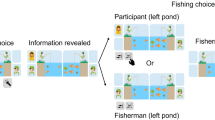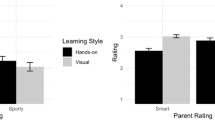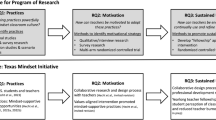Abstract
Direct instruction facilitates learning without the costs of exploration, yet teachers must be selective because not everything can nor needs to be taught. How do we decide what to teach and what to leave for learners to discover? Here we investigate the cognitive underpinnings of the human ability to prioritize what to teach. We present a computational model that decides what to teach by maximizing the learner’s expected utility of learning from instruction and from exploration, and we show that children (aged 5–7 years) make decisions that are consistent with the model’s predictions (that is, minimizing the learner’s costs and maximizing the rewards). Children flexibly considered either the learner’s utility or their own, depending on the context, and even considered costs they had not personally experienced, to decide what to teach. These results suggest that utility-based reasoning may play an important role in curating cultural knowledge by supporting selective transmission of high-utility information.
This is a preview of subscription content, access via your institution
Access options
Access Nature and 54 other Nature Portfolio journals
Get Nature+, our best-value online-access subscription
$29.99 / 30 days
cancel any time
Subscribe to this journal
Receive 12 digital issues and online access to articles
$119.00 per year
only $9.92 per issue
Buy this article
- Purchase on Springer Link
- Instant access to full article PDF
Prices may be subject to local taxes which are calculated during checkout




Similar content being viewed by others
Data availability
The data and analysis scripts that support the findings of this study are available at https://osf.io/wunbq/.
Code availability
Model code and full predictions can be found at https://osf.io/wunbq/.
References
Piaget, J. The Child’s Conception of the World (Harcourt Brace Jovanovich, 1929).
Singer, D. G., Golinkoff, R. M. & Hirsh-Pasek, K. Play = Learning: How Play Motivates and Enhances Children’s Cognitive and Social-Emotional Growth (Oxford Univ. Press, 2006).
Schulz, L. The origins of inquiry: inductive inference and exploration in early childhood. Trends Cogn. Sci.16, 382–389 (2012).
Stahl, A. E. & Feigenson, L. Observing the unexpected enhances infants’ learning and exploration. Science348, 91–94 (2015).
Kline, M. A. How to learn about teaching: an evolutionary framework for the study of teaching behavior in humans and other animals. Behav. Brain Sci.38, e31 (2015).
Caro, T. & Hauser, M. Teaching in nonhuman animals. Q. Rev. Biol.67, 151–174 (1992).
Wellman, H. & Cross, D. Theory of mind and conceptual change. Child Dev.72, 702–707 (2001).
Jara-Ettinger, J., Gweon, H., Schulz, L. E. & Tenenbaum, J. B. The nave utility calculus: computational principles underlying commonsense psychology. Trends Cogn. Sci.20, 589–604 (2016).
Csibra, G. & Gergely, G. Natural pedagogy. Trends Cogn. Sci.13, 148–153 (2009).
Shafto, P., Goodman, N. D. & Griffiths, T. L. A rational account of pedagogical reasoning: teaching by, and learning from, examples. Cogn. Psychol.71, 55–89 (2014).
Bonawitz, E. et al. The double-edged sword of pedagogy: instruction limits spontaneous exploration and discovery. Cognition120, 322–330 (2011).
Baker, C. L., Jara-Ettinger, J., Saxe, R. & Tenenbaum, J. B. Rational quantitative attribution of beliefs, desires and percepts in human mentalizing. Nat. Hum. Behav.1, 0064 (2017).
Lucas, C. G. et al. The child as econometrician: a rational model of preference understanding in children. PLoS One9, e92160 (2014).
Jern, A., Lucas, C. G. & Kemp, C. People learn other people’s preferences through inverse decision-making. Cognition168, 46–64 (2017).
Schulz, L. & Bonawitz, E. Serious fun: preschoolers engage in more exploratory play when evidence is confounded. Dev. Psychol.43, 1045–1050 (2007).
Shneidman, L., Gweon, H., Schulz, L. E. & Woodward, A. L. Learning from others and spontaneous exploration: a cross-cultural investigation. Child Dev.87, 723–735 (2016).
Gweon, H. & Schulz, L. 16-month-olds rationally infer causes of failed actions. Science332, 1524 (2011).
Was, A. M. & Warneken, F. Proactive help-seeking: preschoolers know when they need help, but do not always ask for it. Cogn. Dev.43, 91–105 (2017).
Sobel, D. M. & Kushnir, T. Knowledge matters: how children evaluate the reliability of testimony as a process of rational inference. Psychol. Rev.120, 779–797 (2013).
Koenig, M. A. & Harris, P. L. Preschoolers mistrust ignorant and inaccurate speakers. Child Dev.76, 1261–1277 (2005).
Gweon, H. & Asaba, M. Order matters: children’s evaluation of underinformative teachers depends on context. Child Dev.89, e278–e292 (2018).
Gweon, H., Shafto, P. & Schulz, L. Development of children’s sensitivity to over-informativeness in learning and teaching. Dev. Psychol.54, 2113–2125 (2018).
Sobel, D. M. & Letourneau, S. M. Children’s developing knowledge of and reflection about teaching. J. Exp. Child Psychol.143, 111–122 (2016).
Shatz, M. & Gelman, R. The development of communication skills: modifications in the speech of young children as a function of listener. Monogr. Soc. Res. Child Dev.38, 1–38 (1973).
Ziv, M., Solomon, A., Strauss, S. & Frye, D. Relations between the development of teaching and theory of mind in early childhood. J. Cogn. Dev.17, 264–284 (2016).
Baer, C. & Friedman, O. Fitting the message to the listener: children selectively mention general and specific facts. Child Dev.89, 461–475 (2018).
Rhodes, M., Gelman, S. & Brickman, D. Children’s attention to sample composition in learning, teaching and discovery. Dev. Sci.13, 421–429 (2010).
Bass, I. et al. Children’s developing theory of mind and pedagogical evidence selection. Dev. Psychol.55, 286–302 (2019).
Gweon, H. & Schulz, L. From exploration to instruction: children learn from exploration and tailor their demonstrations to observers’ goals and competence. Child Dev.90, e148–e164 (2019).
Gergely, G., Nádasdy, Z., Csibra, G. & Bró, S. Taking the intentional stance at 12 months of age. Cognition56, 165–193 (1995).
Jara-Ettinger, J., Gweon, H., Tenenbaum, J. B. & Schulz, L. E. Children’s understanding of the costs and rewards underlying rational action. Cognition140, 14–23 (2015).
Liu, S., Ullman, T. D., Tenenbaum, J. B. & Spelke, E. S. Ten-month-old infants infer the value of goals from the costs of actions. Science358, 1038–1041 (2017).
Pesowski, M. L., Denison, S. & Friedman, O. Young children infer preferences from a single action, but not if it is constrained. Cognition155, 168–175 (2016).
Liu, S., Gonzalez, G. & Warneken, F. Worth the wait: children trade off delay and reward in self- and other-benefiting decisions. Dev. Sci.6, e12702–e12708 (2018).
Ronfard, S., Was, A. M. & Harris, P. L. Children teach methods they could not discover for themselves. J. Exp. Child Psychol.142, 107–117 (2016).
Repacholi, B. & Gopnik, A. Early reasoning about desires: evidence from 14- and 18-month-olds. Dev. Psychol.33, 12–20 (1997).
Téglás, E. et al. Pure reasoning in 12-month-old infants as probabilistic inference. Science332, 1054–1059 (2011).
Lagattuta, K. H. Linking past, present, and future: children’s ability to connect mental states and emotions across time. Child Dev. Perspect.8, 90–95 (2014).
Atance, C. M. & O’Neill, D. K. Episodic future thinking. Trends Cogn. Sci.5, 533–539 (2001).
Gweon, H., Asaba, M. & Bennett-Pierre, G. Reverse-engineering the process: adults and preschoolers’ ability to infer the difficulty of novel tasks. In Proc. 39th Annual Conference of the Cognitive Science Society 458–463 (Cognitive Science Society, 2017).
Marr, D. Vision: A Computational Investigation into the Human Representation and Processing of Visual Information (MIT Press, 1982).
Camerer, C., Loewenstein, G. & Weber, M. The curse of knowledge in economic settings: an experimental analysis. J. Polit. Econ.97, 1232–1254 (1989).
Birch, S. & Bloom, P. The curse of knowledge in reasoning about false beliefs. Psychol. Sci.18, 382–386 (2007).
Aboody, R., Velez-Ginorio, J., Santos, L. R. & Jara-Ettinger, J. When teaching breaks down: teachers rationally select what information to share, but misrepresent learners’ hypothesis spaces. In Proc. 40th Annual Meeting of the Cognitive Science Society 70–75 (2018).
Gergely, G. & Csibra, G. Teleological reasoning in infancy: the naïve theory of rational action. Trends Cogn. Sci.7, 287–292 (2003).
Martin, A. & Olson, K. R. When kids know better: paternalistic helping in 3-year-old children. Dev. Psychol.49, 2071–2081 (2013).
Wellman, H., Cross, D. & Watson, J. Meta-analysis of theory-of-mind development: the truth about false belief. Child Dev.72, 655–684 (2001).
Goodman, N. D. & Frank, M. C. Pragmatic language interpretation as probabilistic inference. Trends Cogn. Sci.20, 818–829 (2016).
Gureckis, T. M. & Markant, D. B. Self-directed learning: a cognitive and computational perspective. Perspect. Psychol. Sci.7, 464–481 (2012).
Inzlicht, M., Shenhav, A. & Olivola, C. Y. The effort paradox: effort is both costly and valued. Trends Cogn. Sci.22, 337–349 (2018).
Dweck, C. S. Mindset: The New Psychology of Success (Random House, 2006).
Ahl, R. E. & Keil, F. C. Diverse effects, complex causes: children use information about machines’ functional diversity to infer internal complexity. Child Dev.88, 828–845 (2017).
Magid, R. W., Depascale, M. & Schulz, L. E. Four-and 5-year-olds infer differences in relative ability and appropriately allocate roles to achieve cooperative, competitive, and prosocial goals. Open Mind2, 72–85 (2018).
Benson, J. E., Sabbagh, M. A., Carlson, S. M. & Zelazo, P. D. Individual differences in executive functioning predict preschoolers’ improvement from theory-of-mind training. Behav. Brain Sci.49, 1615–1627 (2013).
Boyette, A. H. & Hewlett, B. S. Teaching in hunter-gatherers. Rev. Philos. Psychol.9, 771–797 (2018).
Legare, C. H. Cumulative cultural learning: development and diversity. Proc. Natl Acad. Sci. USA114, 7877–7883 (2017).
Tomasello, M. Born (and bred) to help. in Why We Cooperate 1–48 (MIT Press, 2009).
Bruner, J. S., Jolly, A. & Sylva, K. Play: Its Role in Development and Evolution (Basic Books, 1976).
Vygotsky, L. S. Mind in Society: The Development of Higher Psychological Processes (Harvard Univ. Press, 1980).
Boyd, R., Richerson, P. J. & Henrich, J. The cultural niche: why social learning is essential for human adaptation. Proc. Natl Acad. Sci. USA108, 10918–10925 (2011).
Tomasello, M., Carpenter, M., Call, J., Behne, T. & Moll, H. Understanding and sharing intentions: the origins of cultural cognition. Behav. Brain Sci.28, 691–735 (2005).
Legare, C. H. & Nielsen, M. Imitation and innovation: the dual engines of cultural learning. Trends Cogn. Sci.19, 688–699 (2015).
Heyes, C. Who knows? Metacognitive social learning strategies. Trends Cogn. Sci.20, 204–213 (2016).
Klahr, D. & Nigam, M. The equivalence of learning paths in early science instruction: effect of direct instruction and discovery learning. Psychol. Sci.15, 661–667 (2004).
Acknowledgements
We thank C. Dweck, M. C. Frank, E. Markman, M. H. Tessler, M. Asaba, K. Weisman and N. Vélez for helpful conversations and insightful comments. We thank G. Bennett-Pierre, A. Singh, F. Kramer, A. Garron and N. Chandaria for help with data collection and coding. We are grateful to the Palo Alto Junior Museum and Zoo, the Tech Museum of Innovation in San Jose and the children and families who participated in this research. This work was funded by a John Templeton Foundation Varieties of Understanding grant (to H.G.), a James S. McDonnell Scholar Award (to H.G.) and an NSF Graduate Research Fellowship (to S.B.). In addition, this material is based upon work supported by the Center for Brains, Minds, and Machines (CBMM), funded by NSF-STC award CCF-1231216. The funders had no role in study design, data collection and analysis, decision to publish or preparation of the manuscript.
Author information
Authors and Affiliations
Contributions
S.B. and H.G. conceived of and designed the experiments. S.B. collected and analysed the data. J.J.-E. designed, implemented and conducted the formal model comparisons, with assistance from S.B. and H.G. S.B., H.G. and J.J.-E. interpreted the results and wrote and edited the manuscript.
Corresponding authors
Ethics declarations
Competing interests
The authors declare no competing interests.
Additional information
Publisher’s note Springer Nature remains neutral with regard to jurisdictional claims in published maps and institutional affiliations.
Supplementary information
Supplementary Information
Supplementary Methods 1 and 2, Supplementary Results 1 and 2, Supplementary Figs. 1–7, Supplementary Note 1 and Supplementary References.
Rights and permissions
About this article
Cite this article
Bridgers, S., Jara-Ettinger, J. & Gweon, H. Young children consider the expected utility of others’ learning to decide what to teach. Nat Hum Behav 4, 144–152 (2020). https://doi.org/10.1038/s41562-019-0748-6
Received:
Accepted:
Published:
Issue Date:
DOI: https://doi.org/10.1038/s41562-019-0748-6
This article is cited by
-
Latent motives guide structure learning during adaptive social choice
Nature Human Behaviour (2021)
-
How young children integrate information sources to infer the meaning of words
Nature Human Behaviour (2021)
-
Orangutan mothers adjust their behaviour during food solicitations in a way that likely facilitates feeding skill acquisition in their offspring
Scientific Reports (2021)



